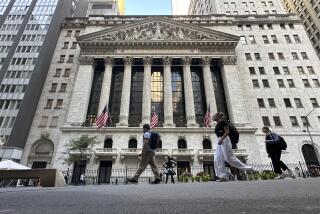Retail Stocks Depressed by Nordstrom’s Flat Profit : Wall Street: More bad news has investors worried that poor fall sales will carry over into the crucial holiday selling season.
Retail stocks were pummeled in active trading Wednesday as Wall Street reacted to Nordstrom’s projection of flat profits and slumping sales for its third quarter and braced itself for more weak September sales reports due today from other major department stores.
Shares of Nordstrom, the upscale Seattle retailer that said Tuesday that its profit for the quarter ending Oct. 31 would be about the same as a year ago, fell $8.50 to $33.75, losing 20% of its value as more than 6 million, or 8% of its 81 million shares, changed hands on the over-the-counter market.
The stock of other national retailers, including Dayton Hudson, operator of Mervyn’s and Target stores, Dillard Department Stores, May Department Stores, Price Club, Kmart, J. C. Penney, the Limited and ClothesTime, also fell as investors became increasingly nervous that disappointing autumn sales will carry over into the all-important holiday selling season looming on the horizon.
“Back-to-school and early fall sales have been a disappointment to the major fashion stores,” said Alan Millstein, a New York retail consultant. “The numbers themselves aren’t absolutely conclusive evidence that Christmas will be poor, but they’re certainly nothing to make a retailer jump for joy, either.”
Major national retailers, including Sears, Wal-Mart, Penney’s, Dayton-Hudson and May, are scheduled to report their preliminary September sales today, but Wall Street analysts are already predicting that only the the so-called “value-priced” chains will report sales gains. The one exception to this, analysts said, is Gap Stores, whose sales, analysts estimate, have been growing at a brisk--for today’s market--8% to 10% annual rate.
“There’s lots of consumer uncertainty in the market now,” said Robert Karr, a San Francisco-area retail consultant. “And there’s evidence that department stores are canceling their Christmas orders.”
Traditionally retailers expect to capture 50% of their profits and about 40% of their sales in the weeks leading up to Christmas.
“I think we’re in for a tough Christmas,” said Robert Buchanan, an analyst for Alex. Brown. “It’s safe to say that the consumer’s staying stingy.”
John Goesling, Nordstrom’s treasurer, said late Tuesday that earnings for the period ending Oct. 31 would be about 25 cents, the same as it earned in the third quarter of 1990. He said sales may be slightly above the 1990 period.
The report shocked Wall Street, which had celebrated the company’s 95% jump in earnings in the first quarter and 39% jump in the second quarter. Nordstrom stock began to tumble Tuesday in after-hours trading.
Less than a year ago, it had risen to a high of $53, from a low of $17.50.
Nordstrom has been cautious about the economic outlook, warning recently that many analysts’ estimates assumed an economic upturn, although no evidence of it was in sight.
Morgan Stanley analyst Bruce Missett said that while Nordstrom’s early earnings projection was a shock, it reflects more of a regional weakness in California, which contributes about half of the firm’s sales, than a new national trend.
Retail Selloff How key retail stocks plunged on news of slowing sales at Nordstrom Inc.
Wed. close Stock and change Nordstrom 33 3/4,-8 1/2 Dayton-Hudson 66 3/4,-2 7/8 Price Co. 55,-2 1/4 Kmart 40 1/8,-1 7/8 J.C. Penney 48 1/4,-1 1/2 Limited 23 1/8,-1 3/8 May 50 1/2,-1 1/4 ClothesTime 8 1/2,-1 1/8
More to Read
Inside the business of entertainment
The Wide Shot brings you news, analysis and insights on everything from streaming wars to production — and what it all means for the future.
You may occasionally receive promotional content from the Los Angeles Times.










